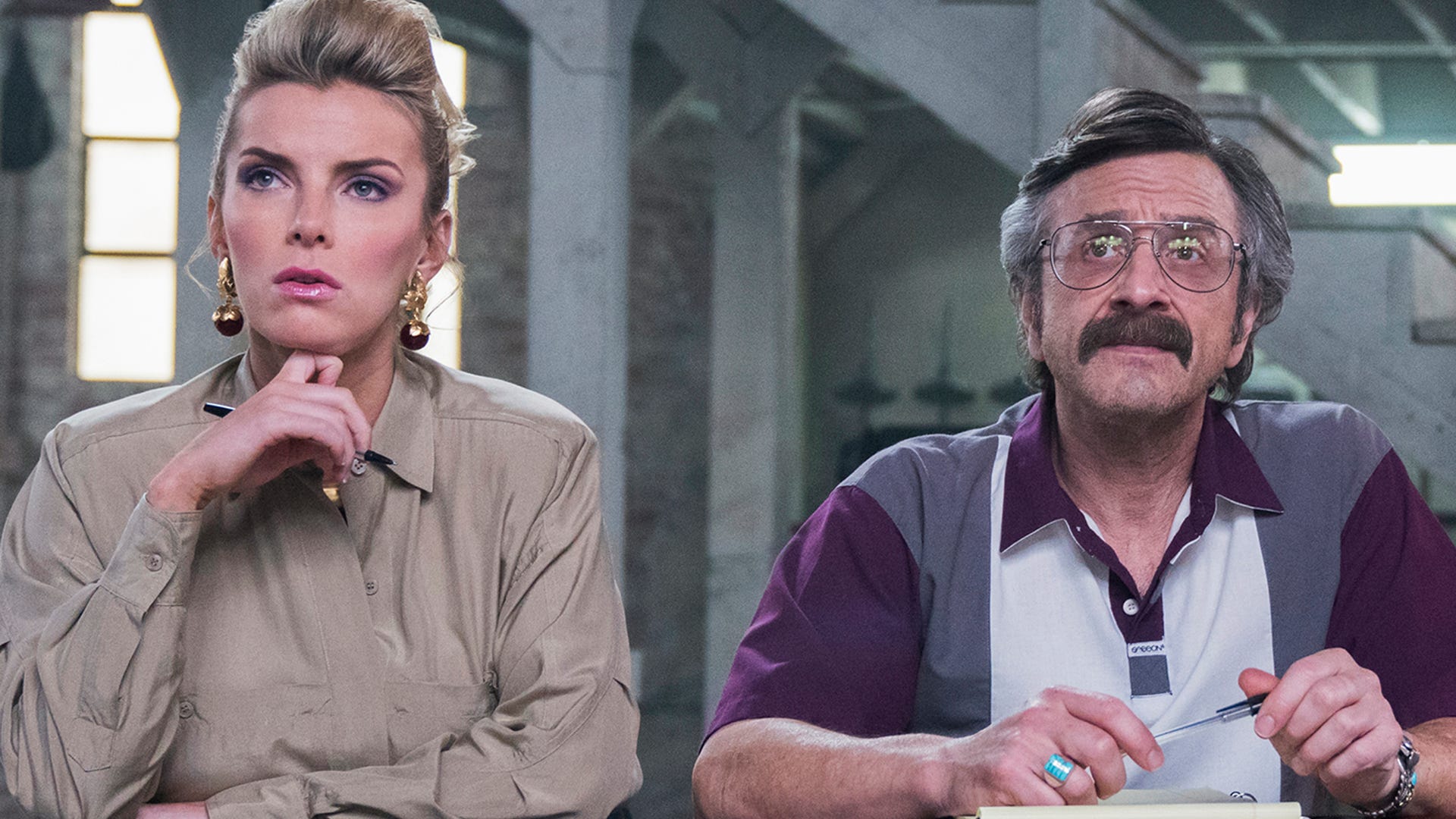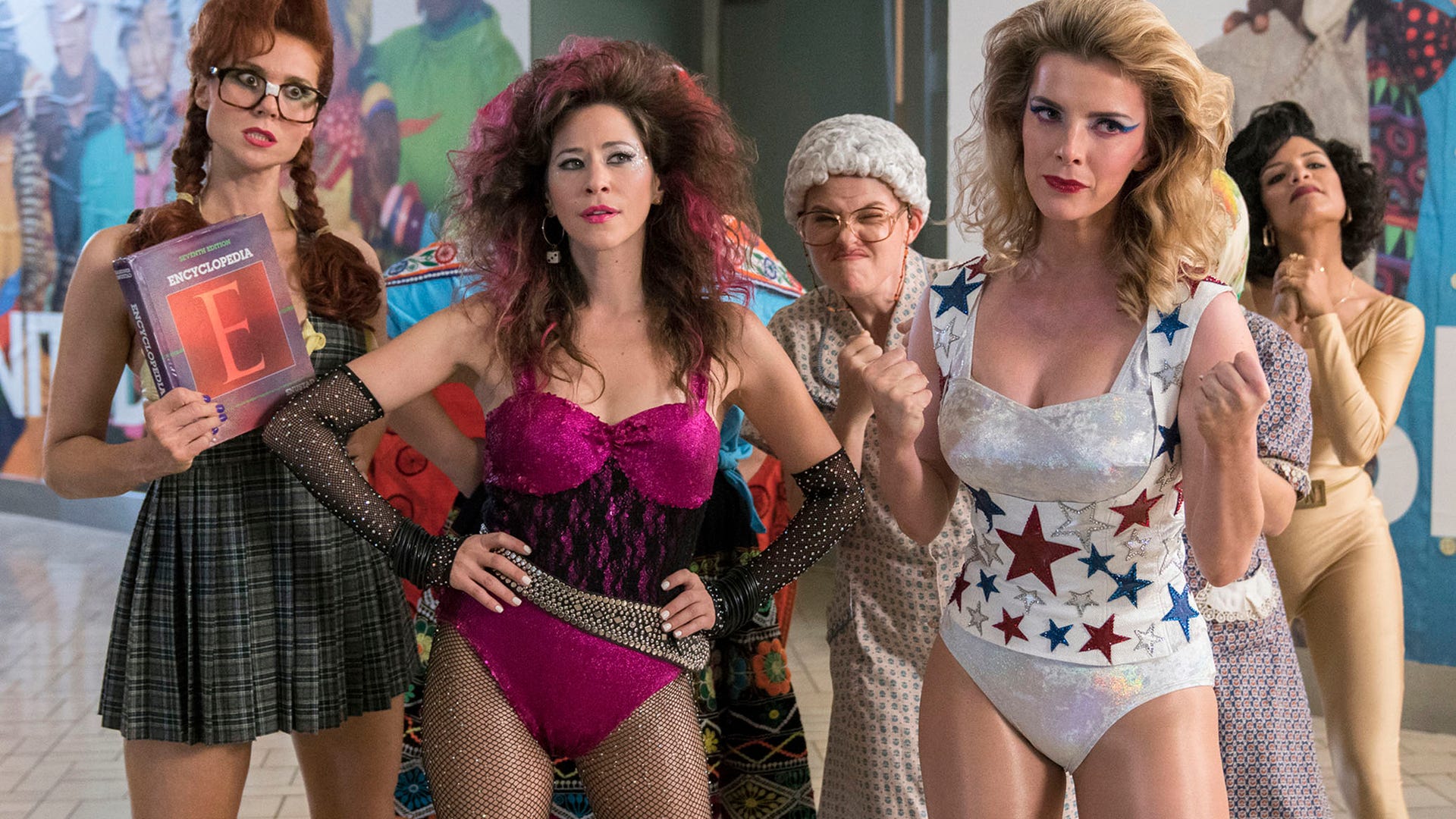Join or Sign In
Sign in to customize your TV listings
By joining TV Guide, you agree to our Terms of Use and acknowledge the data practices in our Privacy Policy.
GLOW's Second Season Asks How Much Has Really Changed In the Workplace
Thirty years later, some of the same issues still persist
[Caution: not insignificant spoilers about Season 2 of GLOW ahead]
GLOW's gang of gallant wrestlers have a lot more work to do in Season 2, now that their low-budget wrestling show airs on a real-deal network. Suddenly this ragtag crew of spirited athlete-actors are professionals with full-time jobs -- roles that require even more focus, creative thinking and ownership than before considering that the show within a show was a fanciful hope. Debbie (Betty Gilpin) becomes a producer. Ruth (Alison Brie) gets to direct, and all the women gain more agency in how they look and what stories they tell in and out of the ring. GLOW's women are more empowered in Season 2, but only up to a point.

Betty Gilpin, Marc Maron, Chris Lowell, GLOW
Erica Parise/NetflixAs has been teased, GLOW has a sexual harassment, Time's Up/Me Too moment in Season 2, as one character endures a humiliating sexual advance from a man of sizable influence and power over her livelihood. Timely and important as that story is though, it's just one piece of a bigger picture about what Debbie, Ruth, Welfare Queen (Kia Stevens), Cherry Bang (Sydelle Noel) and the gang face in the proverbial office. As their stories unfold over the season, GLOW's stars deal with child care, being a working mom, health care, conflicts with other women in the workplace, and even, for the African-American Cherry Bang, what it means to relax hair so she's more palatable for white audiences.
Of course, GLOW takes place in the 1980s, but the world creators Liz Flahive and Carly Mensch have created -- high-waisted jeans and primitive cell phones notwithstanding -- rattles with present-day urgency. As the ladies produce a TV show while juggling the unique demands of working in a male-dominated industry, Season 2 really asks, how much have things for women in the workplace changed?
Why GLOW Deserves to Be Your Next Binge
In 2017, 80 percent of the people running a TV show were men. For directors in the movie industry, where the kind of inclusion riders Frances McDormand called for in her Oscar speech this year inch toward becoming a norm, men outnumber women 22:1. Just 4.8 percent of Fortune 500 CEOs are female -- a 25-percent drop from 2017 that's entirely due to a few women resigning. How's all that relevant to GLOW? Because as the 10 delightful Season 2 episodes illustrate, workplaces without women in leadership roles create, at the bare minimum, environments that put them in boxes and create barriers to creating the best work. And worst-case scenarios, where sexual harassment is a norm and/or women don't make the same amount of money as men doing the same job, are still shockingly pervasive.
If this sounds esoteric, don't forget that Serena Williams, one of the greatest athletes of all time, saw her ranking fall from No. 1 to No. 453 in the world because she took time off to have a baby. This isn't quite the same as GLOW's Debbie getting written off of soap opera Paradise Cove when she got pregnant in Season 1, but it's not drastically different either.
"I remember having a conversation with some women recently who are producers in a mid-career moment and who are wanting to produce studio comedies," series creator Flahive told The Hollywood Reporter. "They were saying things like, 'When I talk to a studio about my contract and needing childcare so I can stay around and produce their movie for 16 hours a day, that conversation drops somewhere and it's just easier for them to hire a man.'"

GLOW
Erica Parise/NetflixOne reason GLOW works so well is that it makes uncomfortable, complicated conversations about gender, sexual harassment, race and sexuality fun. As Season 2 digs deeper into its heroines' lives, it subsequently moves into a naked exposure of systemic sexism, but never in a preachy or loud way. Instead, GLOW pries open spaces for introspection, like when Debbie and Ruth have a pull-no-punches fight over Debbie's choice to be a working mom, Ruth's choice to prioritize career and the resentments that fester between them over those choices -- all due, fundamentally, to a lack of options that would let them really thrive in the workplace. Which is especially unfortunate because, for all that's in their way, the one thing they can't be denied is proof of their demonstrative value. All the women of GLOW have an abundance of talent, drive and business instinct -- evident when Ruth directs the show's dazzling opening sequence, Junkchain whips her girls into prime physical shape or when Debbie works around financial and managerial challenges (and outright discrimination) to keep the show afloat.
"Carly and I are living in a world where all of our executive producers are women, our network executives are mostly women and gay men," Flahive told THR. It might astonish GLOW's fictional women from 30 years ago to learn that the future, at least for their show, is female. For viewers, these heroes are a sobering reminder of how far working women have come, and how much still needs to change.
GLOW begins streaming on Netflix Friday June 29.
